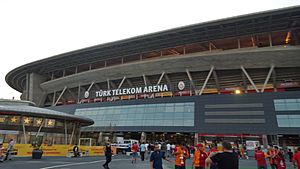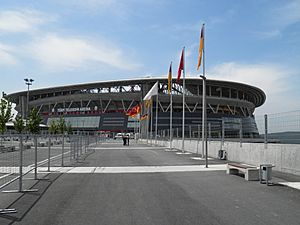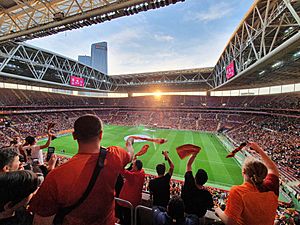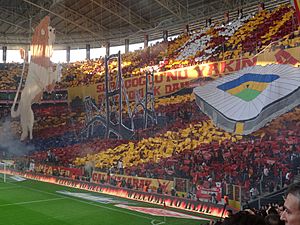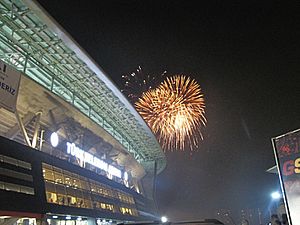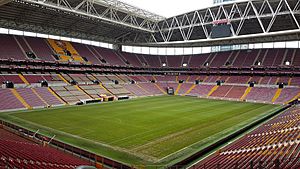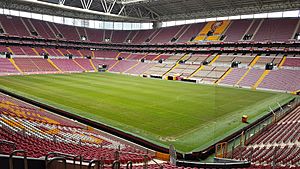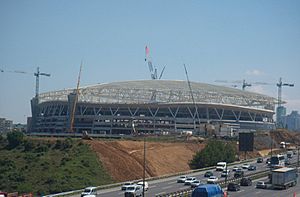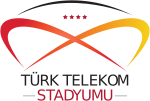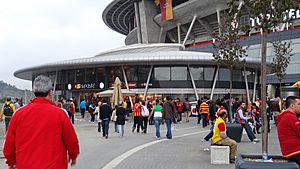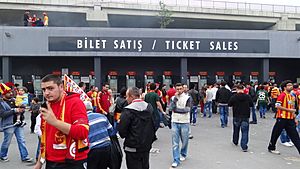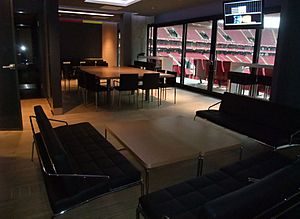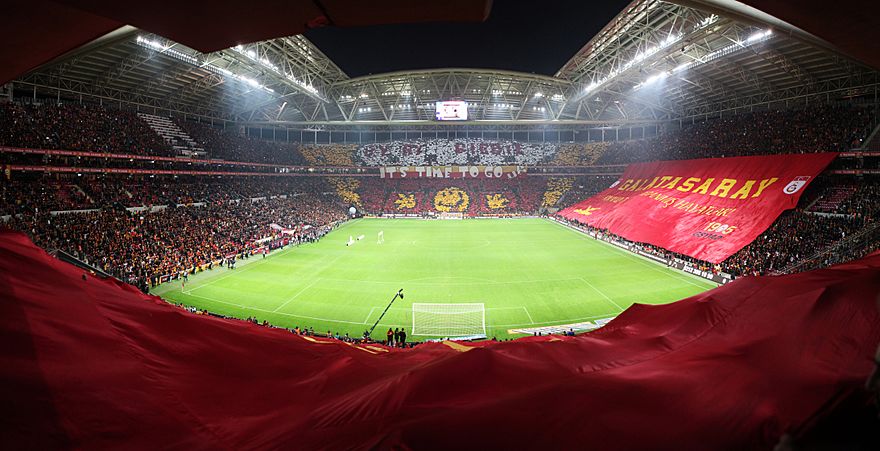Rams Park facts for kids
|
Ali Sami Yen Hell
Aslantepe |
|
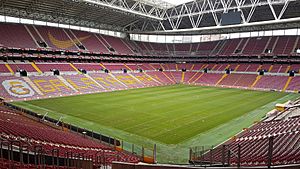
|
|
| Full name | Rams Park |
|---|---|
| Former names | Türk Telekom Arena (2011–2017) Türk Telekom Stadium (2017–2021) Nef Stadium (2021–2023) |
| Location | Sarıyer, Istanbul, Turkey |
| Coordinates | 41°6′10″N 28°59′26″E / 41.10278°N 28.99056°E |
| Public transit | |
| Owner | Galatasaray |
| Operator | Galatasaray |
| Executive suites | 198 |
| Capacity | 52,652 (2011–2013) 52,280 (all-seater) |
| Record attendance | 52,044 (Galatasaray–Real Madrid, 9 April 2013) |
| Field size | 105 m × 68 m (115 yd × 74 yd) |
| Acreage | 190,000 m² |
| Surface | Grass (2011–2018) SISGrass |
| Scoreboard | 2 x 77,41m² |
| Construction | |
| Broke ground | 13 December 2007 |
| Built | 2007–2011 |
| Opened | 15 January 2011 |
| Construction cost | US$250 million ($325 million in 2022 dollars ) |
| Architect | 'asp' architekten Stuttgart |
| Structural engineer | İz Mühendislik Yüksel Proje Schlaich Bergermann & Partner |
| Services engineer | OBERMEYER: Planungsgesellschaft |
| Main contractors | Varyap
Uzunlar Ortak Girişimi TOKİ |
| Tenants | |
| Galatasaray (2011–present) Turkey national football team (selected matches) |
|
The Ali Sami Yen Sports Complex, also known as Rams Park, is a large football stadium. It is the home field for the Süper Lig team Galatasaray. The stadium is in Istanbul, Turkey. It can hold 52,280 fans. The stadium is named after Ali Sami Yen, who founded the Galatasaray club.
This stadium was the first in Turkey to meet the rules for UEFA Euro 2016. In 2011, it was nominated for "Venue of the Year" and "New Venue" awards. Galatasaray won the Süper Lig in their first season playing here. The stadium was even mentioned in a book by Tom Clancy!
Contents
History of the Stadium
Football started in Istanbul on a field called "Priest's Field." Later, the Taksim Stadium became the main football spot. But this stadium was torn down in 1940. Other teams like Fenerbahçe and Beşiktaş found new homes. Galatasaray, however, had trouble finding a place to play.
In the 1930s, Galatasaray tried to get land for a stadium. They found a plot in Mecidiyeköy. In 1940, Galatasaray leased this land for 30 years for a very small fee. They planned to build a modern stadium. But World War II made it hard to get money and supplies.
A small stadium with an open stand was built in 1945. But it was far from the city and hard to reach. So, it wasn't used much for games. When the İnönü Stadium opened in the city center, Galatasaray stopped building their stadium.
In 1955, Galatasaray got to use the land until 2007. The government helped build the stadium starting in 1959. In 1961, Galatasaray officially got the rights to use the new stadium.
The stadium opened on December 20, 1964. It was so crowded that one person died and 80 were hurt. In 1965, lights were added for night games. But in the 1970s, the stadium was used mostly for training. It was not well cared for.
In 1981, grass was planted on the field, and the stadium reopened. The lights were fixed in 1993, and night games started again. Seats were added, which reduced the capacity from 35,000 to 22,000. In 1997, Galatasaray planned to build a new, modern stadium.
On December 10, 2013, a UEFA Champions League match between Galatasaray and Juventus was stopped because of heavy snow. The rest of the game was played the next day.
New Stadium Plans
Over the years, Galatasaray had many ideas for a new stadium.
Early Ideas
In 1998, a plan for a 40,484-seat stadium was made. It even included a modern "loge" system (private boxes). But the city government did not approve it. In 2001, a smaller plan for 35,000 seats was made to save money. But an economic crisis stopped this plan too.
Back to the Old Plan
From 2002 to 2005, the club looked at the 1998 plan again. But they still couldn't get enough money. After some updates, the club went back to playing at the Ali Sami Yen Stadium. In 2005, an old stand was torn down and rebuilt for safety after an earthquake.
Moving to Aslantepe
The old stadium in Mecidiyeköy was now in the city center. The government did not want the stadium to get bigger there. So, they offered Galatasaray new land in a place called Aslantepe.
Finding money for the new stadium took a few years. In 2007, the government agreed to build a new stadium for Galatasaray in Aslantepe. In return, Galatasaray would give up their land in Mecidiyeköy.
A Dream Comes True
In December 2007, the building of the new stadium officially began. This was ten years after the first plans were announced. A new design was chosen. In 2009, construction sped up when a new company took over.
The new stadium, now called Rams Park, opened on January 15, 2011. The Prime Minister, Recep Tayyip Erdoğan, was there.
Stadium Projects Overview
Here's a look at the different plans for the stadium over the years:
| Project | Year | Location | Capacity | Suites | Architect | Cost | Info |
|---|---|---|---|---|---|---|---|
| Faruk Süren project | 1997–2001 | Mecidiyeköy | 40,482 | 125+72 boxes without outside seating | BBB Architects | US$118.5 million ($213 million in 2022 dollars ) |
2 different roof and stand styles. A Mall next to the stadium was also planned |
| Mehmet Cansun project | 2001 | Mecidiyeköy | 35,000 | 132 | GS member Architecture group* | US$35 million ($57.8 million in 2022 dollars ) |
*Emre Arolat, Doğan Hasol, Tabanlioglu Architects, Eren Talu, DB Architects |
| Özhan Canaydın:Back to Süren's project | 2002–2005 | Mecidiyeköy | 40,482 | 125+72 boxes without outside seating | BBB Architects | US$90 million ($143 million in 2022 dollars ) |
Same project, just lower cost |
| Eren Talu bidding project | 2007 | Aslantepe | 52,000 | 150 | Populous | n/a | Eren Talu's project for the bid. GS logo as a ramp |
| Özhan Canaydın project | 2007 | Aslantepe | 52,652 | 157 | asp Stuttgart | US$250 million ($325 million in 2022 dollars ) |
Built |
Aslantepe: The New Home
Galatasaray needed a new stadium because the old one was too small. The new stadium was built near the Maslak business area. The area's old name, Seyrantepe, was changed to Aslantepe (Lion Hill). This is because "Aslan" (Lion) is Galatasaray's symbol. The stadium was designed to be like the Arena AufSchalke in Germany. It will have a roof that can open and close, which is the first of its kind in Turkey.
Building the Stadium
Galatasaray worked with TOKİ, a large Turkish construction group. Four companies bid to build the stadium. The Eren Talu Architecture – ALKE Partnership won the contract in October 2007.
The project was called the "Aslantepe Tender." It included building a sports complex for 52,652 people in Aslantepe. In return, the old stadium land in Mecidiyeköy would be used for other buildings. The stadium was planned to be built in 720 days. It has 198 private suites. It also has VIP lounges, food courts, a Galatasaray Museum, and several Galatasaray stores. The stadium has five levels above ground and four underground levels.
Working Together
The Eren Talu-ALKE group partnered with Abu Dhabi Group and Al Zarooni Group from the UAE. These groups invested $650 million in the project. This money was for both the new stadium in Aslantepe and the new buildings in Mecidiyeköy.
The stadium construction cost about $170 million. Another $180 million was from TOKİ. The rest of the money, over $250 million, was for the buildings in Mecidiyeköy. The project was expected to bring in about $1.3 billion when finished.
Construction stopped twice due to money problems. In July 2009, TOKİ ended the agreement with Eren Talu. A new company, Varyap-Uzunlar, won the next bid. Construction started again in September 2009. The stadium opened without the retractable roof, which was added later.
Starting the Project
On December 13, 2007, the construction officially began. Many important people, including sports ministers, attended the ceremony. The club's president, Özhan Canaydın, said the new complex would be a great addition to Turkish sports. It would show how far Turkish sports had come.
Stadium Names Over Time
The stadium has had different names because of sponsorship deals.
Türk Telekom Sponsorship
The stadium's naming rights were sold to Türk Telekom for 10 years. They paid $10.25 million each year. The stadium was called Türk Telekom Arena. Other companies also sponsored parts of the stadium. Pegasus Airlines sponsored the North tribune. Ülker sponsored the first tier of the East tribune. Denizbank sponsored the suites and VIP seats. Later, Opel sponsored the South stand, and Odeabank sponsored the North stand.
NEF Sponsorship
In October 2021, Galatasaray Sports Club announced a new sponsorship with a real estate company called NEF Gayrimenkul. The agreement was for 10 seasons, worth 725 million Turkish Liras. The stadium was then named Ali Sami Yen Sports Complex Nef Stadium. This was the biggest stadium naming deal in Turkish sports history.
Rams Global Sponsorship
On July 21, 2023, Rams Global became the new main sponsor. The stadium is now called Rams Park.
Stand Sponsors
Here are the companies that have sponsored different parts of the stadium:
| Stand | Sponsor | Duration | € M/year | Total € M |
|---|---|---|---|---|
| Stadium | Türk Telekom | 10 years (2011–2021) | 7.5 | 75 |
| Nef | 2 years (2021–2023) | 7.9 | 79 | |
| Rams Global | 5 years (2023–2028) | 8.7 | 43,5 | |
| North | Pegasus Airlines | 2 years (2011–2013) | 4 | 8 |
| Odeabank | 5 years (2013–2018) | 0.59 | 2.95 | |
| South | Opel | 2.5 years (2012–2015) | 1.5 | 3.75 |
| MNG Kargo | 2 years (2015–2017) | ? | ? | |
| 1st tier East | Ülker | 2 years (2011–2013) | 2 | 4 |
Stadium Facts
Size and Capacity
- The entire stadium area is 195,000 square meters.
- The playing field is 105 meters long and 68 meters wide.
- The stadium can hold 52,280 people.
- The West Stand holds 10,713 people.
- The East Stand holds 11,425 people.
- The South Stand holds 15,246 people.
- The North Stand holds 15,268 people.
Suites
- There are 198 private suites in total.
- These suites have 6,321 seats.
- Each suite can hold 6 to 27 people.
Construction Materials
- About 190,000 cubic meters of concrete were used.
- About 35,000 tonnes of steel were used.
- The roof alone used 5,500 tonnes of steel.
Recent Updates
2012
In 2012, 41 new suites were added. This brought the total number of suites to 198. This makes it the stadium with the second most suites in Europe. The stadium's capacity changed slightly to 52,223.
2018 - Hybrid Grass
In January 2018, a new SISGrass field was installed. This helps the grass stay in better condition.
Concerts and Events
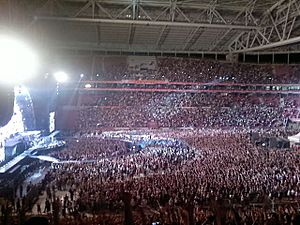
The stadium can also host concerts for over 70,000 people. The first band to play here was Bon Jovi in July 2011. Madonna also performed here in June 2012 for nearly 48,000 fans.
Around the Stadium
Aslanlı Yol
Visitors can walk to the stadium from the Seyrantepe Metro Station. They use a path called Aslanlı Yol (Lion Road). This path is 200 meters long and 45 meters wide. It helps guide fans to the entrance. You can also find ticket sales, restaurants, and shops along this path.
Aslantepe GSStore
A new Galatasaray Store opened near the stadium in February 2012. It is a large store with two floors. The first floor is for shopping, and the second floor is a fan zone.
Getting There
Public Transport
You can reach Rams Park by bus or by the Metro M2 line. The metro has a shuttle line that goes directly to the Seyrantepe station at the stadium.
| Service/Operator | Station/Wharf | Line |
|---|---|---|
| Train |
Seyrantepe Metro station |
By Car
The stadium is right next to the Otoyol 2 motorway. There are four parking garages with space for 3,225 cars. There are also 28 spots for buses.
Payment Methods
GS Bonus Card
The GS Bonus Card is a special stadium card for Galatasaray fans. It can also be used as a credit card. This card works as a season ticket and can be used for all services at the stadium.
fastPay
In March 2019, Galatasaray and DenizBank started a new payment system called fastPay. This allows fans to pay for things at the stadium, stores, and snack bars without using cash. It's Turkey's first digital wallet for a stadium.
Stadium Records
Attendance Records
- The most people ever at Rams Park was 52,044. This was for a UEFA Champions League match between Galatasaray and Real Madrid CF in April 2013.
- For a Süper Lig match, the highest attendance was 51,983. This was for a game between Galatasaray S.K. and Trabzonspor in May 2013.
- The highest attendance for a concert was 47,789 for Madonna's show in June 2012.
Loudest Crowd
On March 18, 2011, Rams Park set a Guinness World Records record for the "loudest crowd roar at a sport stadium." The noise reached 131.76 decibels. This record has since been broken by other stadiums.
Matches Played
Turkey National Team Matches
Rams Park is one of the main stadiums where the Turkey national team plays its home games.
| Date | Time (CEST) | Team #1 | Res. | Team #2 | Round | Attendance |
|---|---|---|---|---|---|---|
| 10 August 2011 | 20.30 | 3–0 | Friendly | 25,000 | ||
| 2 September 2011 | 19.00 | 2–1 | Euro 2012 qualifying | 47,756 | ||
| 7 October 2011 | 20.30 | 1–3 | Euro 2012 qualifying | 49,532 | ||
| 11 October 2011 | 19.00 | 1–0 | Euro 2012 qualifying | 32,174 | ||
| 11 November 2011 | 20.05 | 0–3 | Euro 2012 qualifying | 42,863 | ||
| 14 November 2012 | 20.30 | 1–1 | Friendly | 30,000 | ||
| 17 November 2014 | 20.45 | 3–1 | Euro 2016 qualifying | 27,549 | ||
| 14 November 2019 | 18.00 | 0–0 | Euro 2020 qualifying | 48,329 |
2013 FIFA U-20 World Cup
The stadium was used for the 2013 FIFA U-20 World Cup. During this event, it was called Ali Sami Yen Arena due to sponsorship rules.
Here are the games played at the stadium during the 2013 World Cup:
| Date | Time (CEST) | Team #1 | Res. | Team #2 | Round | Attendance |
|---|---|---|---|---|---|---|
| 21 June 2013 | 18.00 | 3–1 | Group A | 4,133 | ||
| 21 June 2013 | 21.00 | 1–4 | Group A | 4,133 | ||
| 24 June 2013 | 18.00 | 1–1 | Group A | 4,120 | ||
| 24 June 2013 | 21.00 | 1–0 | Group A | 4,120 | ||
| 27 June 2013 | 20.00 | 2–1 | Group A | 7,511 | ||
| 27 June 2013 | 17.00 | 0–1 | Group B | 7,511 | ||
| 2 July 2013 | 18.00 | 2–1 | Round of 16 | 7,211 | ||
| 2 July 2013 | 21.00 | 1–2 | Round of 16 | 7,211 | ||
| 7 July 2013 | 21.00 | 4–3 | Quarterfinals | 6,632 | ||
| 13 July 2013 | 18.00 | 3–0 | Third place match | 20,601 | ||
| 13 July 2013 | 18.00 | 0–0 | Final | 20,601 |
Season Tickets and Attendance
This table shows how many season tickets were sold and the average number of fans at league games each season.
| Season | Sold season tickets | average league attendance |
|---|---|---|
| 2011 (just 2nd half) | 20,000 | 29,887 |
| 2011–2012 | 27,900 | 34,685 |
| 2012–2013 | 47,200 | 43,262 |
| 2013–2014 | 46,250* | 40,094 |
| 2014–2015 | 43,108 | 26,193 |
| 2015–2016 | 39,849 | 18,996 |
| 2016–2017 | 22,167 | 21,751 |
| 2017–2018 | 41,167 | 41,076 |
| 2018–2019 | 46,716 | 36,439 |
| 2019–2020 | 47,729 | 35,231 |
| 2020–2021 | N/A due to COVID-19 pandemic | |
| 2021–2022 | N/A due to COVID-19 pandemic | 21,425 |
| 2022–2023 | 40,105 | 45,516 |
| 2023–2024 | 42,000 | |
*Stopped at 46,250. Demand was 65,000.
Images for kids
See also
 In Spanish: Nef Stadium para niños
In Spanish: Nef Stadium para niños
- List of football stadiums in Turkey
- Istanbul bid for the 2020 Summer Olympics


